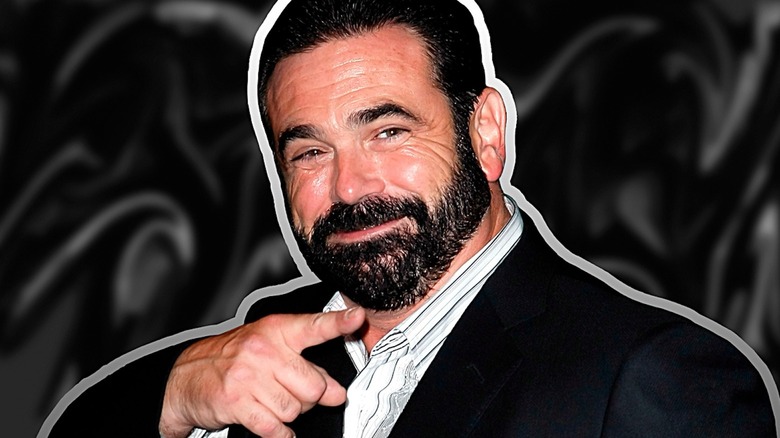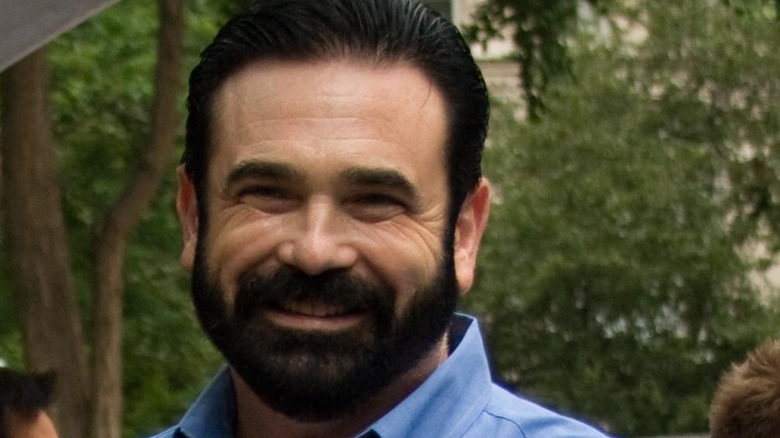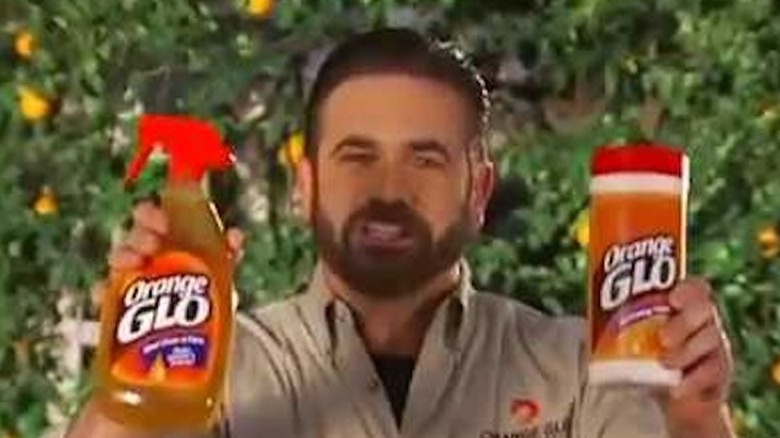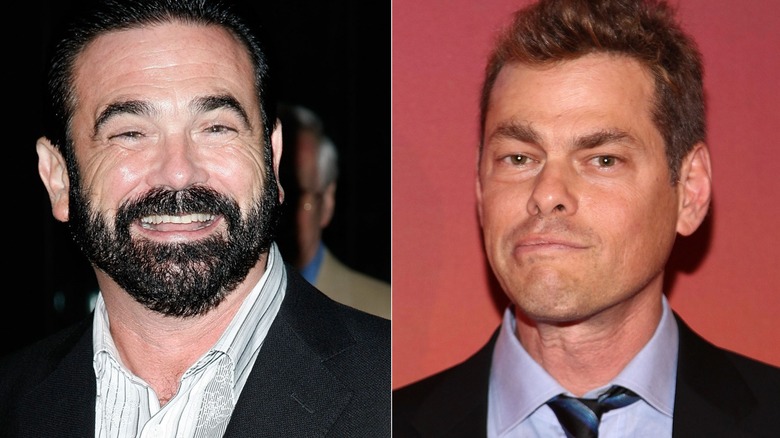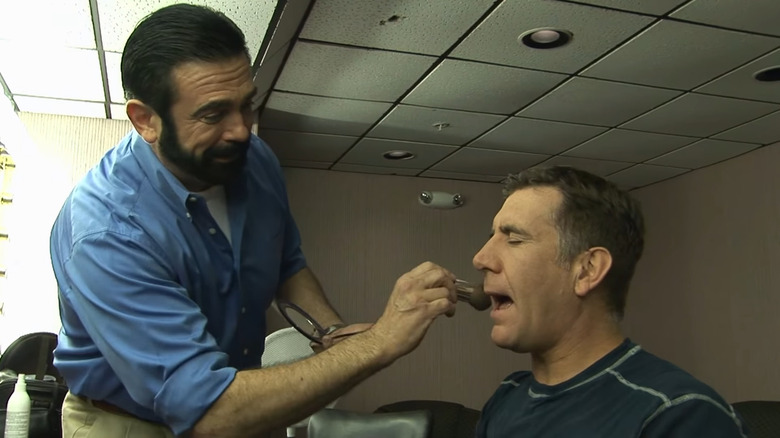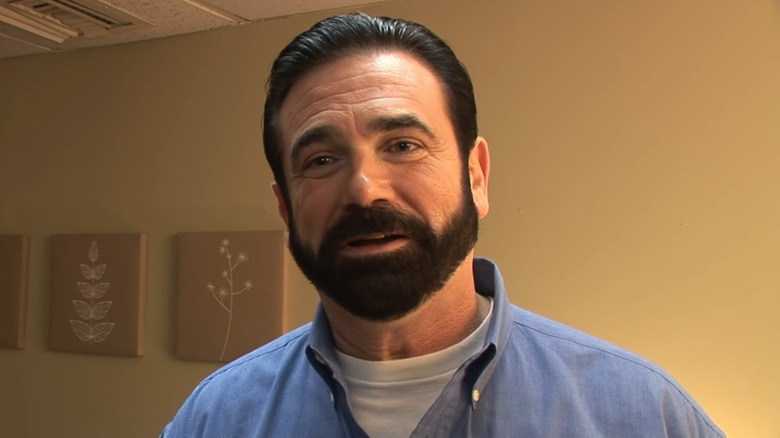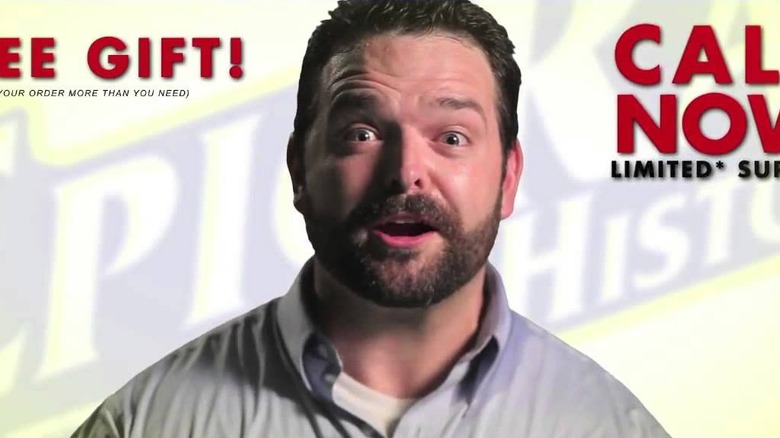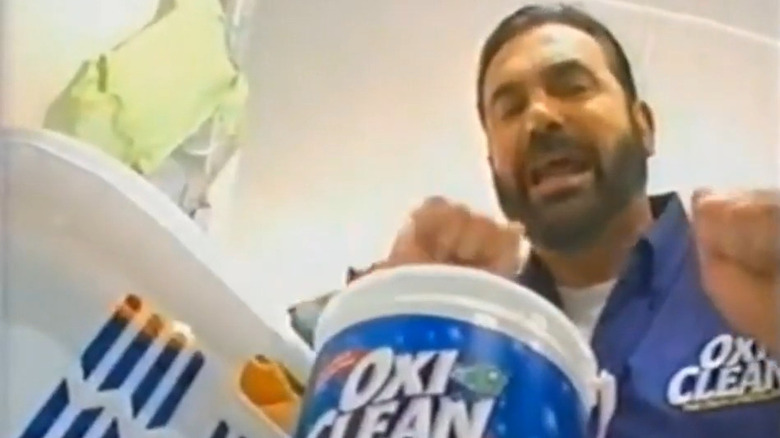The True Life Story And Tragic Death Of Billy Mays: King Of TV Commercials
From the late 1990s to the early 2000s, product pitchman Billy Mays was a ubiquitous presence on television, hawking household products and gadgets that he insisted would make viewers' lives cleaner, safer, and ultimately, happier. Mays had an outsized voice — somewhere between carnival barker and air raid siren — but an everyman's appearance and bearing, which made him both attention-grabbing and trustworthy, a winning combination for product makers and potential customers alike. That one-two punch boosted Mays into pop culture consciousness, a rare destination reserved for only a select number of product spokespersons (see: also Flo from Progressive Insurance, the Geico gecko, et al). Mays parlayed his talents on TV until his untimely death at the age of 50 on June 28, 2009.
Product pitchmen come and go, but Mays seems to remain evergreen, if the wealth of YouTube videos, memes, and other media devoted to his commercials is any indication. While they remember his voice, beard, and blue shirt and khaki pants outfit, they gloss over Mays' long path to stardom, as well as the tragedy of his passing. Let's unpack the legend of Billy Mays and look at how he became the King of TV Commercials, as well as how he remains in the public eye more than a decade after his death.
Billy Mays got his start on the Atlantic City boardwalk
Like all great origin stories, Billy Mays' lies in humble circumstances. Born on July 20, 1958, in McKees Rocks, Pennsylvania, and raised in Pittsburgh, Mays played sports as a youngster. He was on the football team in high school and at West Virginia University but dropped out after two years. He returned home to work at his father's hazardous waste company, but like Peter Parker getting that radioactive spider bite, Mays found his path and purpose in one of the most unlikely ways: selling household products on the boardwalk in Atlantic City, New Jersey.
As Mays told the Washington Post, he came to selling via a friend, who mentioned that he was going to try his hand at selling knives on the boardwalk, a 5-mile stretch of casinos and amusements along the New Jersey coastline (and yes, also the setting for "Boardwalk Empire"). "I went home and grabbed my suitcase," said Mays, who soon took a job shilling household products for International Housewares, Inc. For the better part of the next decade, he pitched to passersby products like the WashMatik, a cleaning system that pumped water from a bucket to a hose without requiring a connection to a water source. "We called him Bucket Billy because he was doing demonstrations with a bucket for five or six years," said former International Housewares president Cris Morris.
[Featured image by Sharese Ann Frederick via Wikimedia Commons | Cropped and scaled | CC BY-SA 3.0]
A chance encounter gave Mays his big break
Working on the boardwalk taught Billy Mays invaluable skills that he would later parlay as the king of infomercials. He learned from veteran pitchmen the art of "ballying," or gathering a crowd to hear a sales pitch. Mays also learned how to spin his pitches to make potential customers want to buy his product. He'd announce an item's price at $29.99 but add that he had to sell them at $15 to 50 customers. "'But for the first 10 people, they cost one $10 bill. Now, who is first?' And then you just point to the nearest guy, the guy who seemed most eager, and say, 'You are number one,'" he told the Washington Post. "And that guy always went along with it. It was amazing. And then someone would raise their hand and say, 'I'm number two,' and pretty soon, you had 10 people handing you money." It helped that Mays had a powerful and durable voice that caught the attention of passersby.
Mays was soon selling products at state fairs and home shows across the United States. And it was at a home show in Pittsburgh that he made a crucial connection: Max Appel, creator of Orange Oil, a cleaning product that used orange oil instead of chemicals. When audio problems upended Appel's pitch, Mays lent him his microphone, which led to his first big break. Appel got a chance to promote Orange Glo on the Home Shopping Network (HSN), and he knew just the right pitchman. Mays debuted on HSN in 1996 and sold 6,000 units of Orange Glo at $18 apiece in just 11 minutes. That appearance marked the beginning of Billy Mays' ascendance to TV fame.
Mays became the King of Commercials
Billy Mays soon became the go-to pitchman on the Home Shopping Network, pitching both Max Appel's products and those from other companies. But when HSN passed on peddling Appel's OxiClean, Appel again tapped Mays to pitch the product on a two-minute infomercial — a type of longer-format television spot that was gaining traction in the 1990s with the rise of cable television and the need to fill network airtime with lucrative programming. The spot featured Mays on full blast, delivering his signature greeting ("Hi, Billy Mays here!") and selling OxiClean with memorable copy like "Powered by the air you breathe, activated by the water that you and I drink!" Audiences were bowled over by his high-volume, high-intensity pitches, but also regarded him as honest, affable, and handsome but not slick. As PR agent Marian Salzman told CNN, Mays was "Burt [Reynolds] in a next-door-neighbor format. Burt was not approachable, but Billy appealed to the 'Mrs. I Push My Cart in Walmart.'"
Not everyone loved Mays' on-camera attacks, with some critics and viewers finding him more assaultive than approachable. A 2008 op-ed published by the Los Angeles Times described Mays as "a commercial spokesman who shouts everything he says and comes on TV just as you're drifting off to sleep." Mays himself acknowledged his critics in an interview with the Orlando Weekly in 2008. "People say that I'm too loud," he said. "But you know, if I tone it way down, sales go way off."
Infomercials made Mays very wealthy
By the early 2000s, Billy Mays was a television staple, lending his big voice and presence to infomercials for products like Mighty Putty and Zorbees. His tenure with Appel ended in 2006 when the company sold OxiClean and its other products to Church & Dwight, the owners of Arm & Hammer, and reportedly left Mays out in the cold. Mays turned the tables on Appel, signing a deal to promote Church & Dwight's products while also producing infomercials through his own production company.
Initially, he took on all offers. "In the beginning, it was like, 'I'm going to show them!'" Mays said to Orlando Weekly. But he eventually pulled back on the reins, turning down products like a toilet seat that signaled if the seat was up or down with lights, or a singing birthday candle that lit up like a flare. Not every product he pitched was a winner: the Cargo Genie, which organized buyers' car trunks, and the collapsible Zip Wrench proved to be dogs. But OxiClean, Mighty Putty, and many more products were huge hits and typically paid Mays on average between $20,000 and $30,000 as well as a portion of the gross revenue. As a result, Mays was a wealthy man, though not off-the-charts rich. "There's this big lore about what I make, like, 'He's a billionaire!' But I'm not," Mays told Orlando Weekly before adding, "Sure, I make over a million dollars."
Informercials also made Mays a pop culture icon
It was only natural for other companies to see the drawing power of Billy Mays' infomercials and want to tap some of that promotional magic for their own products. As a result, Mays turned up on television spots for products outside of his usual field, such as DC Snowboards and National College Athletic Association football. At the time of his death, Mays had also reportedly signed a contract to serve as spokesperson for Taco Bell.
The most unique and amusing of Mays' commercial assignments was his string of spots for ESPN 360 (now ESPN3.com), the online platform for the sports network juggernaut. One spot had Mays reveal ESPN 360's "secret" for bringing their game coverage to viewers' laptops (it's the internet), while another spot found Mays extolling ESPN 360's ability to keep fans informed when they were on the go. The commercial, which takes place on a set made up to resemble a cheap motel, cuts to a shot of Mays' "suitcase," which contains nothing but duplicates of his signature infomercial outfit: a blue polo shirt and khaki pants.
Billy Mays could take a joke ... most of the time
For the most part, Billy Mays handled gentle ribbing about his screen presence with good humor. He even participated in a comedy sketch (via Infomercial Hell) on a 2009 episode of "The Tonight Show with Jay Leno" which featured him as "Billy Shakespeare," who explained the Bard's plays with the same over-the-top delivery as his infomercials. Mays' son, Billy Mays III, also told participants in a 2013 Reddit AMA that his dad was a fan of JaboodyDubs, a YouTube parody page that redubbed Mays' infomercials with decidedly outrageous (and NSFW) language. "My dad wasn't very computer/internet-literate but he would always mention 'Jaboody Dubs' to people who were," he wrote.
However, Mays was not a fan of anyone he perceived as aping or mocking his style of pitching. Case in point: Vince Offer, the in-your-face pitchman for the ShamWow cleaning towel. In a 2009 radio interview (via Popular Mechanics), Mays declared that Offer was treading in his territory with the ShamWow and suggested a "pitch-off" to determine which of the two was the "ultimate pitchman." Undoubtedly, some of this animosity was borne from the fact that Popular Mechanics declared the ShamWow more capable of cleaning up messes than Zorbees. Nothing appears to have come of the "pitch-off," but as an episode of Mays' reality series "PitchMen" illustrated, Offer and the ShamWow were still sore points if mentioned in his presence.
Mays co-starred in a reality series
In 2009, Billy Mays furthered his pop culture icon status by co-starring in a reality TV series for the Discovery Channel. "PitchMen" partnered Mays with his friend Anthony "Sully" Sullivan, a fellow veteran pitchman and infomercial producer; the pair judged household products by amateur inventors and awarded the winner an infomercial with Mays as pitchman. In between the competition segments, "PitchMen" also followed elements of Mays and Sullivan's personal and professional lives, including a visit with Mays' father, Bill Mays, Sr., and team-ups with other pitchmen to help them with their products.
Unfortunately, the promise of the first season was cut short by Mays' untimely death in June 2009. Mays passed shortly before the final episode of Season 1 aired, which left the Discovery Channel scrambling to retool the series for a sophomore season. The series' producers eventually settled on teaming Sullivan with other guest pitchmen and even the occasional celebrity guest, like Dr. Drew Pinsky. Discovery pulled the plug on "PitchMen" at the end of Season 2.
Mays' death was a shock
Billy Mays' death on June 28, 2009, shocked fans and the media alike, and the days that followed the news were filled with speculation and supposition. Mays reportedly told his family on the evening of June 27 that he was feeling unwell and went to bed in his Tampa, Florida, home around 10 p.m. that evening. Mays' wife found him unresponsive the following morning and called Tampa police. First responders pronounced the 50-year-old Mays dead at 7:45 a.m. on June 28.
Initial reports suggested that an accident that occurred during a flight on June 27 may have contributed to Mays' death. He was struck on the head when a carry-on item fell from the overhead cargo space on a United Airways flight into Tampa International. At the time, Mays told the media that he had suffered no injury as a result of the accident, adding, NPR quotes, "I got a hard head."
An initial autopsy report on June 29, 2009, found that hypertensive heart disease was the cause of Mays' death. The condition, a complication of high blood pressure, increases the chance of heart failure in many cases, the Cleveland Clinic warns, and can prove fatal if the causes remain untreated. Mays was buried in his hometown of McKees Rocks, Pennsylvania, on July 3, 2009. Pallbearers at the ceremony wore his traditional infomercial outfit of a blue shirt and khaki pants.
Narcotics were found in Mays' system
Though hypertensive heart disease was listed as Billy Mays' cause of death, a toxicology report released on August 7, 2009, suggested that narcotics may also have played a role in his passing. The report found cocaine in Mays' system and listed it as a contributory cause of death. The report also found levels of several prescription painkillers in Mays' system, including hydrocodone and oxycodone, as well as alprazolam and diazepam, two prescription anti-anxiety medications. The presence of the painkillers was attributed to Mays' chronic hip problems, for which he was scheduled to have surgery.
The toxicology report did not sit well with Mays' family, who issued a press statement that expressed their disappointment in what they considered to be "speculative conclusions" regarding Mays' death. They eventually commissioned a second medical report, which revealed in October 2009 that while cocaine was present in Mays' system, it was not a "significant contributing factor" in his death.
Despite the second report, Mays' family had to deal with lingering assumptions about his death. In the aforementioned 2013 Reddit AMA, Mays' son said that while his father "struggled with many different impulses throughout his life," he also stated that "he was in no way a 'cokehead'" — a label he attributed to many media reports issued after his father's death that suggested that he died of an overdose.
If you or anyone you know needs help with addiction issues, help is available. Visit the Substance Abuse and Mental Health Services Administration website or contact SAMHSA's National Helpline at 1-800-662-HELP (4357).
Mays remained on TV after his death
Many of the companies that featured Billy Mays in their infomercials pulled the spots from rotation on television after his death. Most notable among these was OxiClean and Orange Glo manufacturers Church & Dwight, though they did keep Mays' image on the OxiClean website as an homage to the pitchman. However, several other companies continued to air Mays' infomercials and even debuted new spots in the weeks that followed his death. In a 2009 interview on CNBC, Mays' lawyer, Roger Pliakas, said that networks wanted to wait for a statement from his family before airing any old or new spots, which they received in mid-2009. Their consent returned many of Mays' best-known infomercials to the airwaves, including spots for Mighty Putty and the Awesome Auger, as well as new spots for products like the Jupiter Jack, a wireless speakerphone, which Mays filmed shortly before his death.
Response to the new and revived ads were mixed. The CNBC piece quoted Remy Stern, author of the infomercial industry book "But Wait ... There's More!" who found Mays' posthumous return to the airwaves unsettling but completely understandable. "For the infomercial guys, any press is good press," he said. For others, Mays' spots were an unexpected windfall: Media Enterprises president Bill McAlister told CNBC that Mays' infomercial for the Superpack, a Mighty Putty-related product, had been seen 20 to 30% more times than views recorded before the pitchman's death.
Pop culture continues to pay tribute to Mays' memory
Billy Mays' enduring status as a pop culture icon was honored in several different ways after his death. "South Park" included him in their Season 13 episode "Dead Celebrities," which featured Mays as one of many famous spirits that appear to one of the characters. In an interview (via TMZ) with Tampa's WFLZ, Mays' son, Bill Mays III, praised the episode, saying that it was "tasteful" and a funny way to honor his memory.
Somewhat less reverent in its attitude towards Mays was a Season 1 episode of the web series "Epic Rap Battles of History," which pitted Mays (played by Colin J. Sweeney) against Benjamin Franklin (played by series co-creator EpicLLOYD). Mays, as depicted in the episode, dies after firing off a single verse at Franklin and is replaced by none other than Vince Offer (played by series co-creator Nice Peter). In his Reddit AMA, Mays III acknowledged that he'd seen the "Epic Rap Battles" featuring his father, but was less effusive in his assessment than in regard to "South Park," deeming the episode "EPIC" and nothing else.
Billy Mays III keeps his father's legacy alive
For his own part, Billy Mays III has maintained his father's legacy through BillyMays.org, a website devoted to the seemingly countless pop culture representations of his father. Visitors will find a dizzying array of Mays imagery, from memes and fan artwork and even a Halloween costume (Mays III even hosted a contest for the best costume based on his father's look). Mays III, who also writes and records electronic music as Infinite Third, has lent his father's image to several products, including a T-shirt and pint glasses, which benefit various charities through their sales.
Mays III said that the inspiration for the charitable products was his father's own kindness; as he wrote on the site, his father often surprised fans by asking them about their own lives. "I view this mission as a continuation of my dad's kindness and generosity and hope it will inspire others to create a positive ripple from the grief of losing a loved one," he wrote.
